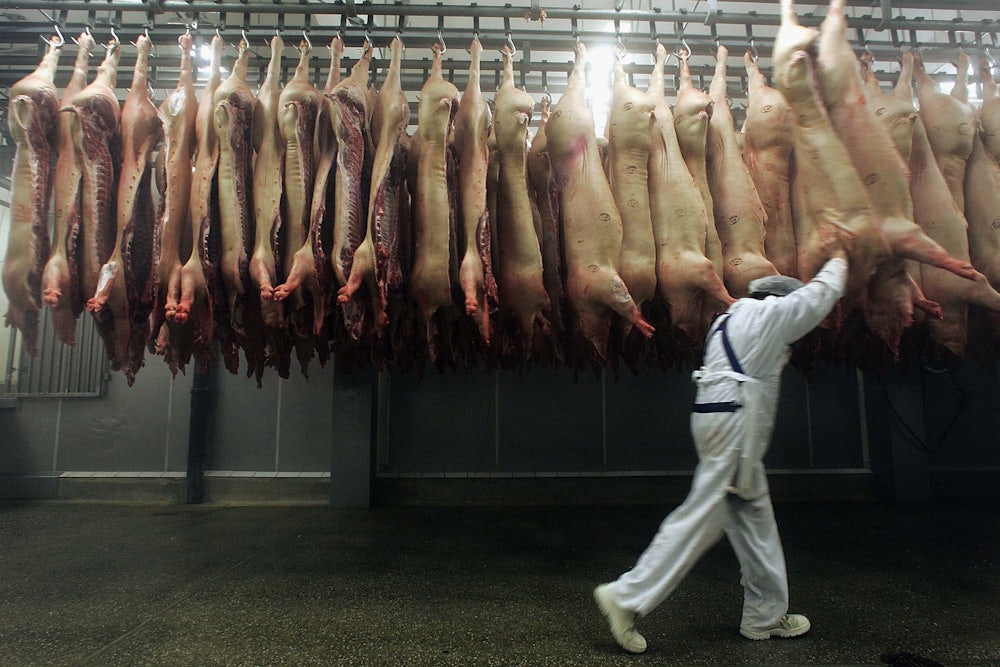Invoking the Korean War–era Defense Production Act, Donald Trump signed an executive order Tuesday mandating that American meat production keep running at all costs—workers and grave threats to public health be damned. According to the United Food and Commercial Workers, 20 industry employees—many working shoulder to shoulder at a rapid clip, without proper protection, in what was already one of the country’s most dangerous jobs—have already died.
In dramatic full-page ads in The Washington Post, The New York Times, and Arkansas Democrat-Gazette on Sunday, Tyson Foods warned that the country’s food supply chain was breaking. A Tyson facility in Waterloo, Iowa, had to be shut down last weekend after being linked to 200 cases of Covid-19. Many workers have been walking off their meatpacking jobs in protest at pitiful conditions. As of Monday, 44 percent of the Waterloo plant’s workforce had tested positive for coronavirus; 90 percent of cases in surrounding Black Hawk County can be traced back to the plant. At least 4,400 meatpacking workers across 80 plants in 26 states had tested positive as of Wednesday. These spreads could now be replicated around the country as shuttered meatpacking facilities limp back to life, including in some parts of the United States already proving to be coronavirus hot spots. Trump’s executive order could give the plants further license to ignore guidance from the Centers for Disease Control and Prevention and the Occupational Safety and Health Administration, which is voluntary anyway.
These facilities were already a danger to public health. The increasingly consolidated industrial meat-raising and meatpacking operations run by Tyson, Smithfield, and the other companies now begging for federal assistance have long been veritable petri dishes for zoonotic pathogens. Their business models rely on what author Mike Davis has called “vast excremental hells, containing tens of thousands of animals with weakened immune systems suffocating in heat and manure while exchanging pathogens at blinding velocity with their fellow inmates.” As it infects workers with the coronavirus, industrial animal agriculture may well be brewing the next deadly, world-stopping pandemic. Meanwhile, the factories’ rampant air and water pollution, and the health conditions they provoke, make the inordinately poor, black, and brown communities surrounding them more vulnerable to Covid-19 and other diseases. That’s not even to mention factory farming’s gargantuan contributions to global warming, which itself increases the likelihood of future zoonotic epidemics.
The best way to invoke the Defense Production Act today, then, would be to shut down industrial meatpacking operations until we can figure out whether there’s a more sustainable, equitable, and safe way of running them. For all the xenophobic talk about Wuhan’s “wet markets”—one of many possible origins of the current pandemic—the Chinese government closed them down when they were seen to pose a risk. The U.S. would be wise to follow suit with its own disease-spreading facilities.
There are plenty of other things for people to eat. Meat-heavy diets are a relative novelty in the course of human history, and in some alternate universe we might imagine the U.S. government embarking on an ambitious advertising campaign instructing people how to prepare nutritious vegetarian meals. It might even, as part of a green recovery package, invest in research and development toward healthier and more humane meat alternatives, sales of which were up 265 percent in the first weeks of the shutdown. It wasn’t so long ago, after all, that meat was rationed nationwide, and the Department of Agriculture encouraged patriotic Americans to use animal products sparingly and take up canning and gardening for the sake of saving lives. But times have changed. Tyson and Smithfield executives have shareholders hungry for dividends, and the current governmental position seems to be that if a few thousand workers and their family members have to die for those dividends, so be it.
As Upton Sinclair detailed over a century ago, industrial livestock operations are some of the ugliest sights capitalism has to offer. Trump’s order to reopen meatpacking facilities, whatever the cost, can be seen as a kind of trial balloon for the Republican-backed premature reopening of the rest of the economy, costing an unknown number of lives. The coronavirus, though, has exposed the main weakness of the GOP and the corporate executives it frequently proves loyal to: They need people to work for them. Workers hold an enormous amount of leverage over some of the world’s most profitable companies—as Amazon and Instacart are starting to realize—and the economy as a whole: Workers are the ones keeping these companies and arguably society going, and usually on miserable wages. That’s also why Iowa Governor Kim Reynolds has threatened that workers who walk off the job will lose their right to collect unemployment benefits. Not just in slaughterhouses, but across the country, the extent to which workers manage to take a stand on outrageous labor conditions may mean the difference between an orderly reopening of the economy and a murderous one.
